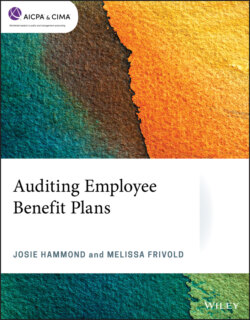Читать книгу Auditing Employee Benefit Plans - Josie Hammond - Страница 2
Table of Contents
Оглавление1 Cover
2 Chapter 1: Employee Benefit Basics Plan as defined by ERISA Plans as defined by GAAP Popular plan types Tax compliance elements Key plan operational concepts Understanding the plan under audit Notes
3 Chapter 2: Accounting and Reporting Standards Applicable guidance Fair value measurements Financial statements Investment valuation and income recognition Accounting and reporting for investment contracts Accounting and reporting for contributions Notes receivable from participants (participant loans) Operating assets Accrued liabilities Accounting for uncertainty in income taxes Plan mergers Terminating plans Subsequent events Recent developments
4 Chapter 3: Reporting and Audit Requirements Audit requirement Regulatory reporting and disclosure requirements for pension and welfare plans Deadlines and extensions The audit guide ERISA versus GAAP Audit considerations Common audit concerns or deficiencies Using the work of internal auditors Recent developments Note
5 Chapter 4: Audit Planning Key parties Client acceptance Scope and timing Gaining an understanding of a plan, its environment, and its internal controls Risk assessment Audit documentation Analytical procedures Initial audit procedures
6 Chapter 5: 401(k) and Other Defined Contribution Pension Plans (Except ESOPs) Determination of benefit amount Net assets available for benefits Changes in net assets available for benefits Investments Contributions receivable Notes receivable from participants Other operating assets Cash Accrued liabilities Investment income Contribution revenue Participant data and participant accounts Participant-directed versus self-directed Benefit payments Expenses Financial statement presentation and required disclosures 403(b) plans Note
7 Chapter 6: Defined Benefit Pension Plans Determination of benefit amount Financial statements Investments and investment income 401(h) accounts Funding Participant data and plan obligations Benefit payments Expenses Financial reporting and disclosure Plan transfers (plan mergers, spin-offs, and other transfers) Terminations Note
8 Chapter 7: Health and Welfare Plans Defined contribution versus defined benefit Challenges in auditing a health and welfare plan Components of the financial statements of a welfare benefit plan Unique features of a health and welfare benefit plan Disclosure requirements Reporting requirements
9 Chapter 8: Other Auditing Considerations Related party and party in interest transactions Prohibited transactions Untimely deposits of employee deferrals ERISA supplemental schedules Form 5500 information consistency with financial statements Tax status Auditing corrective actions Certified information Investment confirmations Going concern
10 Chapter 9: Wrapping Up Commitments and contingencies Subsequent events Representation letter from management Communication of internal control-related matters identified in an audit Management advice letter considerations Communication with those charged with governance
11 Appendix A: Illustrative Financial Statements and Disclosures for a Defined Contribution Plan With Participant-Directed and Nonparticipant-Directed Investment Programs
12 Appendix B: Illustrative Financial Statements and Disclosures for a Defined Benefit Plan Assuming an End-of-Year and Beginning-of-Year Benefit Information Dates Notes
13 Appendix C: Illustrative Financial Statements and Disclosures for a Health and Welfare Plan Notes
14 Appendix D: Illustrative Supplemental Schedule of Assets Notes
15 Appendix E: Illustrative Supplemental Schedule of Reportable Transactions
16 Appendix F: Illustrative Example of an Engagement Letter for a 401(k) Employee Benefit Plan Audit Engagement Notes
17 Appendix G: Small Pension Plan Audit Waiver Decision Tree
18 Appendix H: Report Modifications Chart Notes
19 Appendix I: Pension Plan Audit Decision Tree Note
20 Appendix J: Illustrative Supplemental Schedule of Delinquent Participant Contributions
21 Employee Benefit Plans Glossary
22 Index
23 Solutions Chapter 1 Chapter 2 Chapter 3 Chapter 4 Chapter 5 Chapter 6 Chapter 7 Chapter 8 Chapter 9
24 End User License Agreement
